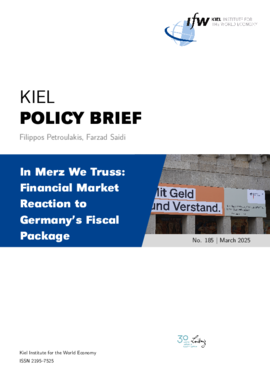Authors
Publication Date
Key Words
Related Topics
Fiscal Policy & National Budgets
Germany
Economic Policy in Germany
• This study analyzes capital market reactions to Germany’s recent announcement of loosening fiscal restrictions for defense and state-level spending, while establishing a €500 billion infrastructure investment fund. In particular, we examine whether surging Bund yields reflect growth expectations or fiscal risk concerns.
• Clear evidence of growth expectations: The steepening German yield curve, rising stock prices, euro appreciation, and stable credit default swap prices collectively indicate that markets interpret Germany’s fiscal expansion as growth-enhancing rather than a reckless fiscal bet.
• The contrast with the UK’s Truss-Kwarteng episode is stark: Unlike the 2022 UK “mini budget” aftermath, which triggered a selloff across all UK asset classes, Germany’s announcement has seen positive market reception across different asset classes, suggesting confidence in Germany’s fiscal credibility.
• While the policy shift introduces some uncertainty, evidenced by modest increases in the European VSTOXX volatility index, this reaction appears calibrated and partially attributable to concurrent global market events, reinforcing the interpretation that markets view Germany’s fiscal expansion as responsible.







